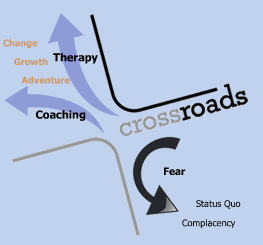Therapy vs. Coaching
 If you research the Internet for information about the difference between
Coaching and Therapy, one relatively common theme you'll find is
that coaching is basically intended for healthy, capable people
that want to become more
effective, while therapy is for disfunctional, broken people
that need healing. If you research the Internet for information about the difference between
Coaching and Therapy, one relatively common theme you'll find is
that coaching is basically intended for healthy, capable people
that want to become more
effective, while therapy is for disfunctional, broken people
that need healing.
Often this is presented in a somewhat simplistic
set of contrasting bullet lists. I think the differences
are more subtle than this, with even a noticeable amount of overlap.
A More Accurate Perspective
I was struggling to capture my own perspective on this topic until, during
some research, I came across the information Greg Mulhauser provided on
his website:
coaching.mulhauser.net/background-details/coaching-vs-therapy.html
As both a therapist and a coach, I believe Greg has
a more objective and realistic perspective. Here are some excerpts
from his website:
The Distinction Between Coaching and Therapy is Subtle
I am skeptical of coaching writers who offer to tell you, sometimes
with a simple bullet point list, how coaching and therapy differ.
All too often, the explanation reads like a shameless marketing pitch
designed
to coax you into viewing yourself as the ideal coaching client.
("Coaching
clients are forward-looking people who take charge of their lives!" or "Counselling
clients are in need of guidance and possibly a medical cure" --
that sort of thing.)

 more...
more...
The Most Important Difference is in You
Having said all that, it remains the case that coaching and counselling
are not the same thing. Generally speaking, the most important difference
is actually in you, the client (simple bullet point list, coming right
up!):
- Generally, clients seek counselling when they sense something is wrong.
- Generally, clients seek coaching when they sense something is not as right as they would like it to be.

 more...
more...
For Adults with ADD It's Really Therapy PLUS Coaching
The first consideration as it relates
to us folks with ADD is that it really is not an either/or decision.
ADDers often simultaneously sense something is wrong and something
is not as right as they would like it to be ;-)  And
I think there's some good reason for this ... And
I think there's some good reason for this ...
First, there is something wrong. Wait, before
my coaches and mentors hyperventilate, let me
re-language that: There is something different that
seems wrong (Madelyn, Peggy , Kate does that ease your minds?)
The difference is ADD brains do not work the same as a typical brain.
A qualified therapist understands
and recognizes ADD symptoms. With a wide range of medication and
behavioral modification options, she is well qualified to provide
diagnosis and treatment to help normalize an ADD brain. Often
adults with ADD (myself included) have suffered decades of self-critical
evaluation and frustration, without a clear understanding of the
medical options available to help them.
Second, ADD adults often have ethusiastic vision and great ideas about
the future, but sense there is something inhibiting them from
carrying things out as well as they would like. This is where coaching
became critical for me.
Often, I would try to explain my struggles
to someone (even to my wife, who knew everything about me) only
to leave both of us frustrated. Neither one of us could clearly
understand the other's perspective. Techniques that seemed so
straight forward and worked so well for her would simply
discourage me when she offered them as a possible solution for
me. My inconsistent behavior and unpredictable responses only added
to her confusion. One day I would be on, only to spend the
next 3 days seeming confused and exhausted. Even as I write this, I
can
sense her frustration when she would finally say, "I just don't
understand."
What I've learned through my experience (personally, as well as through
coaches, mentors, and clients) is that an ADD adult typically has
the most success through a combination of therapy (having someone
who understands, diagnoses, and treats the disorder) and coaching
(having someone who understands
- first hand - the impact of the disorder). toReview
|